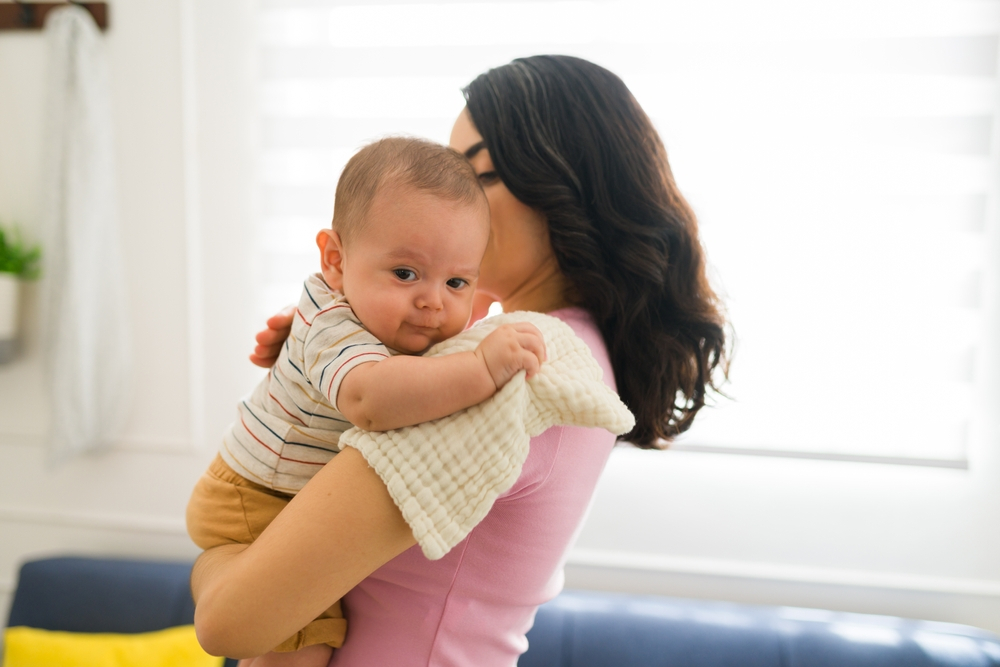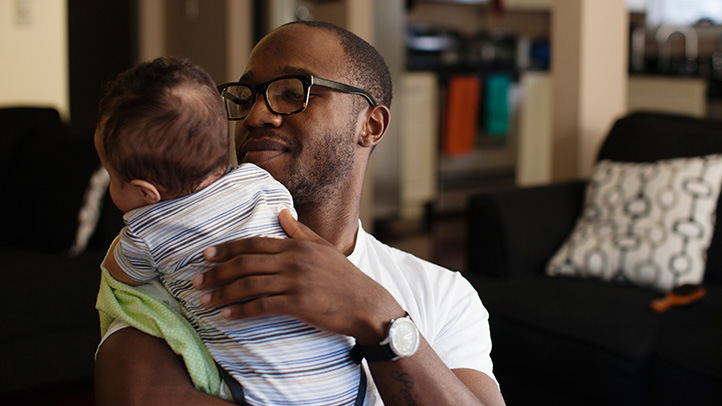Ensuring your baby is comfortable before sleep is a top priority for parents. Burping is often a key part of the bedtime routine, aimed at reducing discomfort and preventing gas. Yet, not all babies need to burp before napping or settling down for the night.
Some infants easily expel gas on their own or simply don’t swallow much air during feeding. This discussion is vital because understanding when and if burping is necessary can help streamline your baby’s sleep routine. Peaceful sleep is crucial for your baby’s development and your well-being, making it essential to adapt bedtime practices to your baby’s needs. Recognizing the signs of comfort or distress will guide you in deciding whether to burp your baby before sleep.

Why Burp Babies?
Many parents wonder if it’s safe to put their baby to sleep without burping. Burping is a key part of feeding that helps babies release air trapped in their stomachs. This air can make babies feel uncomfortable and fussy. Why burp babies? It’s simple: to help them feel better and reduce spit-ups and discomfort. Let’s explore the benefits and bust some myths about burping your little one.
Benefits Of Burping
Burping a baby can seem like a task, but it has several important benefits:
Parents often find a gentle pat or rub on the back does the trick. Yet, some babies may not need to burp as much as others. Each baby is unique, so it’s important to learn your baby’s needs.
Common Myths Surrounding Burping
When it comes to burping, there are several myths that can mislead new parents:
| Myth | Fact |
| Babies must burp after every feed. | Not all babies need to burp after every feed. Some may not swallow much air. |
| Not burping leads to colic. | Colic is caused by various factors. While trapped air can cause discomfort, it’s not the sole reason for colic. |
| Hard patting is necessary for burping. | Gentle pats or rubs are often enough to help a baby burp. |
| Babies can’t sleep without burping. | Some babies can sleep without burping, especially if they didn’t swallow much air. |
Remember, every baby is different. What works for one may not work for another. It’s key to observe and learn from your own baby’s cues and habits.
When Burping Might Be Necessary
Many parents wonder about the need to burp their baby before bedtime. Burping helps release air swallowed during feeding, which can cause discomfort and gas. While some babies might sleep soundly without burping, others may need help to avoid restlessness or colic. Burping becomes necessary when your baby seems uncomfortable, has been feeding for a long time, or has a history of being gassy. It’s important to read your baby’s cues and determine if burping could enhance their comfort and sleep quality.

Techniques For Burping Sleepy Babies
Finding gentle yet effective techniques to burp a sleepy baby can be a game-changer. Here are some methods you can try:
Each baby is unique, so what works for one might not work for another. Keep trying different positions until you find what’s comfortable for both you and your baby. Remember to always support the baby’s head and neck, and never pat too hard. Here’s a simple table to remind you of the key points:
| Technique | Position | Tips |
| Over the Shoulder | Baby’s chin on shoulder, upright against chest | Support head, pat/rub back gently |
| Sitting Up | Baby on lap, leaning forward | Hold chin and chest, pat back |
| Lying Across Lap | Face down across your lap | Support chin, pat back softly |
Remember: Patience is key. Burping might take a few minutes, but it ensures your baby sleeps comfortably. If your baby falls asleep quickly and doesn’t seem disturbed, they might not need burping every time. Trust your instincts and your baby’s signals to guide you.
Can I Skip The Burp? Signs It Might Be Okay
Many parents wonder if it’s safe to put their baby to sleep without burping. Sometimes, after feeding, your little one falls asleep so peacefully it feels wrong to wake them for a burp. But is skipping the burp okay? There are signs that might suggest it’s fine to let your baby sleep without burping. Let’s explore what happens if you skip this step and when it might be okay.
Consequences Of Skipping Burps
Not burping your baby might lead to discomfort or more serious issues. Here’s why:
However, not all babies need to burp after every feeding. Here are some signs it might be okay to skip:
- Your baby seems comfortable and doesn’t show signs of discomfort.
- They have fewer spit-ups or episodes of vomiting.
- They can sleep peacefully for several hours without waking up cranky.
In summary, while burping is essential, there are times you might not need to. Observe your baby’s cues and act accordingly. Always consult with a pediatrician if you’re unsure.
Alternatives To Traditional Burping
Many parents wonder if it’s safe to let their baby sleep without burping. Traditional burping helps to get rid of air that babies swallow during feeding. This air can make babies feel uncomfortable and gassy. But sometimes, babies fall asleep while feeding and might not burp. There are other ways to help reduce gas without waking your baby. Let’s explore alternatives to traditional burping that can keep your baby comfortable.
Pediatricians’ Perspectives
Pediatricians understand that every baby is different. Some babies might need to burp a lot to feel comfortable, while others may not. If your baby falls asleep without burping and doesn’t seem uncomfortable, it might be okay to skip traditional burping. Here are some alternatives pediatricians suggest:
Some parents worry about the risk of spit-ups or discomfort if their baby doesn’t burp before sleeping. A comfortable sleeping position can help reduce this risk. Laying your baby on their back is best. Check out this table for more tips:
| Tip | How It Helps |
| Feed before baby is too hungry | Reduces swallowing air due to frantic feeding |
| Check the bottle’s nipple | Ensures it’s the right size to prevent extra air intake |
| Quiet feeding environment | Keeps baby calm, reducing air swallowing |
Remember, if your baby seems uncomfortable or gassy after skipping burping, consult your pediatrician. They can offer personalized advice based on your baby’s needs.
The Importance Of Burping
The Importance of Burping cannot be overstated when it comes to newborn care. New parents often wonder about the necessity of burping their baby before putting them to sleep. It’s a common practice to help infants release air swallowed during feeding. This process prevents discomfort and aids in digestion. But is it always necessary? Let’s delve into why burping is crucial and when it might be okay to skip this step.

Understanding The Burping Process
Burping helps to remove trapped air that babies ingest during feeding. This trapped air can cause a feeling of fullness and discomfort, which may lead to fussiness or interrupted sleep. By burping your baby, you help them feel more comfortable and settle down easier.
Signs Your Baby Needs To Burp
When Is It Safe To Put Baby To Sleep Without Burping?
Sometimes, your baby may fall asleep while feeding and seem undisturbed. If your baby is consistently calm after feedings and shows no signs of discomfort, it might be safe to put them down without burping. Each baby is unique, so observe their behavior and respond accordingly.
Tips For Effective Burping
- Hold your baby upright against your chest or shoulder.
- Gently pat or rub their back in a circular motion.
- Try different positions, like laying your baby on their lap, to find what works best.
Alternatives If Baby Won’t Burp
If your baby doesn’t burp after a few minutes, don’t worry. Try laying them down on their back for a short while. You can then attempt burping again. Sometimes, a change in position is all it takes for that elusive burp to emerge.
Safe Sleep Practices
Many new parents wonder about the best way to put their baby to sleep, especially when it comes to burping. Is it necessary to burp your baby before bedtime? And if not, what are the safe sleep practices to ensure your little one rests well and safely? Understanding how to balance these needs can bring peace of mind to bedtime routines.
Understanding Baby’s Digestion And Sleep
Babies often need help releasing air swallowed during feeding. This can cause discomfort and may disturb their sleep. A gentle pat on the back can ease this. Yet, sometimes a baby may fall asleep without burping. If they seem content and restful, it’s generally okay. Ensure they sleep on their back on a firm surface, free from soft bedding and toys.
The ‘back To Sleep’ Rule For Newborns
Always place your baby on their back to sleep. This position reduces the risk of Sudden Infant Death Syndrome (SIDS). Keep the crib bare and avoid blankets, pillows, and bumpers. A fitted sheet on a firm mattress with a sleep sack is the safest choice for your baby’s slumber.
Creating A Safe Sleep Environment
Maintain a cool, comfortable room temperature. Use a noise machine for a soothing background sound if needed. Keep the crib in the parents’ room for the first year. This close proximity can make nighttime feedings easier and allows for quick checks on the baby.
When To Consult A Pediatrician
Some babies may need to burp more often to prevent discomfort. If you notice your baby is fussy, gassy, or spits up frequently, talk to your pediatrician. They can offer personalized advice and reassurance for your baby’s needs. Remember, each child is unique, and what works for one may not work for another.
Frequently Asked Questions
A baby who doesn’t burp might experience discomfort from gas buildup or wake up sooner due to mild tummy pains. However, many infants can sleep soundly without burping and face no negative effects.
Yes, you can put your baby down if he hasn’t burped, especially if he seems comfortable or falls asleep after feeding. Some babies don’t always need to burp.
It’s unlikely for a baby to choke in their sleep due to not being burped. However, burping can help prevent discomfort from gas build-up.
Most babies can stop being burped between 4 to 6 months old. This is when they start sitting up and their digestive system matures. Always observe your baby’s comfort and needs, as some might require burping for a longer period.
Conclusion
Burping your baby is a common concern for new parents. While it’s often beneficial, it’s not always necessary. Every child is different, and some may sleep peacefully without burping. Trust your instincts and consult with your pediatrician for personalized advice.
Remember, a comfortable baby and a relaxed parent lead to the best sleep for both.

